Meet our current MRM-ers!

Ana Sofia Barrera
barranas@oregonstate.edu
Advisor: Kirsten Grorud-Colvert
marine protected areas • conservation • coastal communities
Originally from Mexico City, I got my undergraduate degree in General Biology and Marine Science at UC San Diego. Although Mexico City is far from the ocean, I grew up visiting the Pacific coast very often. As such, I became extremely fond of the cultural and social practices surrounding my country's coastline. This fondness ties into my current research, which involves looking at the intersections between community and environmental well-being throughout coastal Mexico through the lens of area-based management. My long-term goal is to return home and work in marine conservation to develop and implement sustainable practices in collaboration with local communities.

Jace Bell
belljace@oregonstate.edu
Advisor: Steve Dundas
economics • climate change • coastal ecosystems • managed retreat
I grew up and completed my undergraduate degree more than a thousand miles from the ocean. My lifelong fascination with the sea and study abroad experiences in Costa Rica and Australia sparked an interest in how communities and governments will adapt to rising sea levels and the influence of policies on community resilience. My research focuses on the economic dimensions of managed retreat, with my thesis comparing managed retreat programs in New York with unmanaged retreat in North Carolina. My long-term goal is to bridge science, education, and policy while keeping the implications of climate change for people and at-risk communities at the forefront of decisions.

Joellen Callahan
callajoe@oregonstate.edu
Advisor: Michael Harte
fisheries • human dimensions • environmental justice
I grew up on the East Coast, spending my childhood in North Carolina and attending college in Florida. I earned my B.S in Environmental Science at the University of Tampa, where I studied the environmentalist identity in Northern Ghana through the honor’s program. I also have experience working as a field technician for an environmental consulting group, studying listed and endemic species across multiple habitats in Florida. My thesis research explores the environmental justice implications of international fisheries for the remote island nation of Tristan da Cunha in the South Atlantic. My professional goal is to work on intersectional sustainability and its influence on ocean policy.
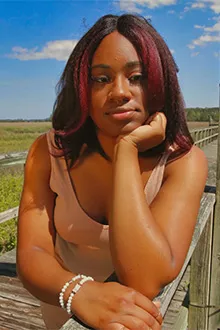
Savannah Clax
claxs@oregonstate.edu
Advisor: Jessica Miller
climate change • fisheries • hypoxia
Originally from the midwest, I attended Savannah State University where I earned a B.S. in Marine Sciences. During my time as an undergrad, I got involved in research regarding otoliths and climate impacts. My current research combines these two topics as I look at the effects of hypoxia and temperature on Petrale Sole growth using otoliths. My future goals include working in coastal resource management and finding better ways marine science can be communicated to the general public.

Alicia Ellingson
ellingal@oregonstate.edu
Advisor: Ford Evans
sustainable aquaculture • coastal communities • marine industry
Growing up in the mountains of Southern California and exploring the coastline during my undergraduate years, I’ve long been fascinated by the link between land and sea. Living and working in Southeast Alaska and the Pacific Northwest has deepened my passion for seaweed and shellfish aquaculture, both on-land and offshore. Developing sustainable farming practices to promote resilient coastal communities and marine ecosystems marks the heart of my research. Specifically, I’m experimenting with on-land cultivation methods for Pacific Dulse, a protein-rich seaweed grown here on the Oregon coast. Throughout this work and thereafter, I am committed to strengthening relationships between farmers, researchers, and communities, ensuring all members feel valued in voicing their challenges, as these insights are critical to shaping effective and relevant solutions.
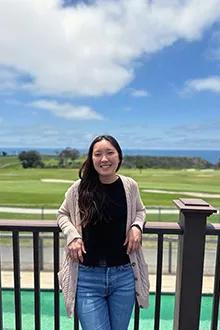
Miriam Hauer-Jensen
hauerjem@oregonstate.edu
Advisor: Kate Stafford
policy • noise pollution • climate change • marine mammal acoustics
I am from Little Rock, Arkansas and received my bachelor's degree in Organismal Biology with a minor in music at Scripps College. In undergrad, I joined a lab studying the impact of temperature change on barnacle metabolism through feeding experiments. I also spent several summers studying marine mammal vocalizations in the Southern Ocean to determine species presence and distribution. My current research will focus on studying bearded seal and walrus vocalizations in the Chukchi Sea in the midst of retreating sea ice. My goal is to work on solutions and advocate for policies that protect marine life from the negative impacts of anthropogenic noise and climate change.
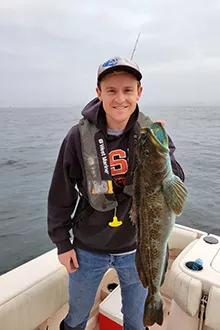
Dylan Heppell
heppelld@oregonstate.edu
Advisor: Mark Lomeli
bycatch • conservation • fisheries
Born and raised in Oregon, I attended Oregon State University where I earned a B.S. in environmental sciences with a specialization in aquatic biology. As an undergraduate I studied the correlation between coralline algae cover and species richness in Oregon coast tidepools. After graduating, I spent a year living in Florida working for Reef Environmental Education Foundation. While there, I worked on a variety of scientific projects but was primarily focused on removal of invasive lionfish. My current MRM research is centered around bycatch reduction in the halibut longline and bottom trawl fisheries on the west coast. My long-term goals are to work closely with conservationists and stakeholders to find conservation solutions that can be a benefit to all.
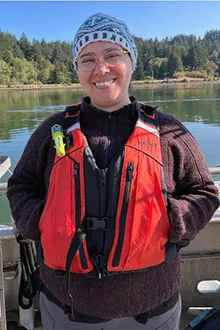
Emily Hicks
morrowe@oregonstate.edu
Advisor: Tracy Crews
invasive species • aquaculture • oysters • biosecurity
I am studying the perceptions held by consumers and growers towards the invasive mud blister worm (Polydora spp.) in PNW estuaries. I'm also working on projects with Oregon Sea Grant on the impacts of a herpes virus on Oregon aquaculture, as well as national campus biosecurity policies. After graduation, I hope to continue working on campus biosecurity, as well as with oysters and invasive species. I live in Veneta, OR with my life partner, daughter, and cats. In my free time, I enjoy bicycling, hiking, reading scifi and fantasy, quilting, knitting, and baking.

Alexandra Kaminski
kaminsal@oregonstate.edu
Advisor: Kelsey Emard
aquaculture • food sovereignty • livelihoods
Originally from Connecticut, I received my bachelor’s degree in Conservation Biology with a minor in Marine Science from SUNY College of Environmental Science and Forestry. My undergraduate research focused on food sovereignty in relation to climate adaptation in coastal Fijian communities. This interest in food systems coupled with a love for the ocean motivated me to pursue a graduate degree. A desire to combine community-based sociological research with sustainable ocean systems brought me to the MRM program where my research will focus on Oregon’s seafood systems and the climatic, social, and political barriers fishers and harvesters face. I hope to improve the livelihoods of coastal communities and work alongside stakeholders to create more effective management plans.
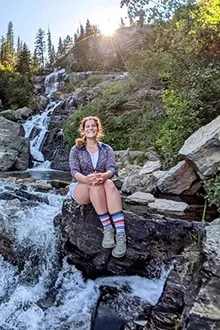
Kelsey Lank
lankk@oregonstate.edu
Advisor: Tracy Crews
science communication • policy • coastal communities
I grew up in Michigan and received my B.S in Environmental Engineering from Michigan Technological University. When I graduated, I preferred my water bodies "unsalted and shark-free," but this changed when I began working in the dredging/marine construction industry. As I completed beach renourishment and harbor/port deepening projects, I became much more aware of the need for greater transparency and communication between technical experts and communities. This led me to MRM where I will be researching best practices for making technical information "digestible" to coastal communities, including scalable programs that support communities to influence policy. My career goal is to support coastal communities, especially underserved communities, through a position at a nonprofit or in coastal management.
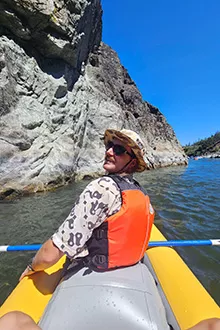
Brandon Lindsey
lindsbra@oregonstate.edu
Advisor: Sam Chan
invasive species • shellfish industry • policy
Having been exposed to SCUBA at a young age and witnessing the lionfish invasion among Caribbean reefs, I became very interested in the cascading effect of invasives and pursuing marine research. After receiving a B.A. in Evolutionary Biology and Ecology from the University of Colorado Boulder, I found it hard to leave the mountains, where I spent my summers focused on invasive plants, freshwater fish, and stream morphology, while winters were focused on snagging first tracks in the high country. I now am thrilled to be returning to the ocean to study the invasive European green crab, a species of concern for the PNW shellfish industry and Oregon’s economy more broadly. After grad school, I hope to continue invasive species work through a nonprofit or government agency such as NOAA, helping to influence policymakers and keep our fisheries sustainable.

Diania Remy
remyd@oregonstate.edu
Advisor: Karen McLeod
diversity, equity, and inclusion • STEM education • policy
Born and raised in Miami, Florida, my deep connection to the ocean is rooted in my Caribbean heritage. I earned a B.S. from Florida State University, where I developed a passion for marine education and advocacy. Following graduation, I worked with the Office of STEM Teaching Activities, teaching K–12 students about the wonders of the ocean and the importance of environmental stewardship. My current research focuses on the shifting landscape of Diversity, Equity, and Inclusion policies in today’s political climate in the US. I document the narratives of professionals who are resisting, adapting to, and overcoming these changes within academic and professional spaces. In my free time, I enjoy gardening, visiting wineries, and studying new languages.

Adam Shokes
shokesa@oregonstate.edu
Advisor: Sam Chan
multitrophic aquaculture • urchins • sea cucumbers • red seaweed
Born and raised in Charleston, South Carolina, I earned a B.S. in Packaging Science at Clemson University, aiming toward the goal of helping to reduce plastic waste output. After realizing I wanted to pursue research that had more direct implications for the ocean, I came to the Marine Resource Management Program, where I’m conducting research on the implications of diet for the efficiency of multitrophic aquaculture, using Pacific purple sea urchins, California sea cucumbers, and Pacific dulse. I'm excited expand my understanding of the trophic linkages among these species and their implications for aquaculture, with an eye to pursuing further education and a future career in applied marine research.

Mariah Smith
smithm68@oregonstate.edu
Advisor: Kelsey Emard
marine protected areas • co-management • cultural heritage
My love for the ocean wasn’t born from growing up near it. I was raised in Boise, Idaho, surrounded by mountains and farmland, but I like to think my fascination with the sea is rooted in my Bahamian heritage. Sparked at age nine and deepened through travel and a degree in Spanish Language and Literature, my path eventually led me to scuba diving and work with marine conservation NGOs. Teaching and working with these organizations in remote parts of the world revealed both the beauty of restoration work and the injustices faced by local, often marginalized, communities excluded from ocean management. These experiences now drive my research on the social and cultural dimensions of Afro–Costa Rican leadership in Cahuita’s co-management system, where I explore how historical heritage, community knowledge, and cultural practices shape decision-making, equity, and long-term success in marine protected area management.

Savana Stallsmith
stallsms@oregonstate.edu
Advisor: Maria Kavanaugh
ecosystem monitoring • artificial intelligence • phytoplankton • conservation
Originally from Indiana, I grew up far from the coast but always felt drawn to the ocean. After high school, I moved to the Pacific Northwest and quickly developed a deep appreciation for marine ecosystems and ocean conservation. Before joining the Marine Resource Management program, I worked in engineering, building solar panels and assisting with quality control for residential and commercial water filtration systems. While that experience strengthened my interest in sustainability, I wanted to focus more directly on ocean systems, which led me to earn a B.S. in Oceanography from Oregon State University. My MRM research focuses on large-scale ecosystem monitoring and the use of artificial intelligence to analyze phytoplankton dynamics and other biological indicators of ocean health. I’m particularly interested in how artificial intelligence models can enhance species conservation while also serving as early indicators of climate change and ecosystem resilience. Through MRM, I aim to integrate science, technology, and resource management to inform conservation decisions and strengthen the adaptive capacity of marine ecosystems in a changing climate.

Michael (Mick) Weingartner
weingarm@oregonstate.edu
Advisor: Angee Doerr
food production • invasive species • management • policy
Originally from Alaska, I grew up with a deep respect for and interest in human interactions with marine systems. I spent five years in Washington, DC working first for a climate change nonprofit, then for a member of Congress in the Senate across a wide range of legislative policies. Before coming to Oregon State University, I also spent two years working for an algae aquaculture operation where I developed an interest and experience in marine food production. My research interests include the human side of coastal resource management, and my current research involves assessing the needs and priorities of coastal stakeholders in the management of the invasive green crab (C. maenas). My long-term goals are to contribute to the development of state and/or federal policies at the nexus of climate change impacts, marine ecosystems, and food production.

Taylor Wood
woodtay@oregonstate.edu
Advisor: Maria Kavanaugh
conservation • harmful algal blooms • cooperative fisheries
I’m originally from Chicago but moved to the Oregon coast after graduating from Oklahoma State University with a B.S. in Zoology. I’ve worked throughout Oregon studying marine ecology and specializing in environmental education and science communication. My work with the central coast conservation community led me to the MRM program, where I am studying the presence of harmful algal blooms off the Oregon coast through collaboration with a cooperative fisheries research network. My goal is to work at the intersection of ecological research and marine conservation, while focusing on integrating local communities into the adaptive management process. I also explore my love of the marine environment through surfing and creating ocean-inspired art.

Samuel Yevak
yevaks@oregonstate.edu
Advisor: Jessica Miller
fisheries • costal limnology • policy
I was born and raised in Colorado, yet I have always felt a strong connection to water, particularly the ocean. Motivated to remain close to water and explore its complexities near home, I pursued a B.S. at the University of Colorado Boulder and worked with the Niwot Ridge Long Term Ecological Research (LTER) network as an alpine limnologist. I am thrilled to take the next step in my career and live more connected to the ocean through my MRM degree. For my thesis research, I will apply my expertise in limnology to Oregon’s coastal systems and investigate the ecological mechanisms underlying the high survival of Oregon Coastal Coho Salmon in large coastal lakes. Long term, I aspire to conduct fisheries research that is relevant to state and federal policy.
Go to the Marine Resource Management Program page.